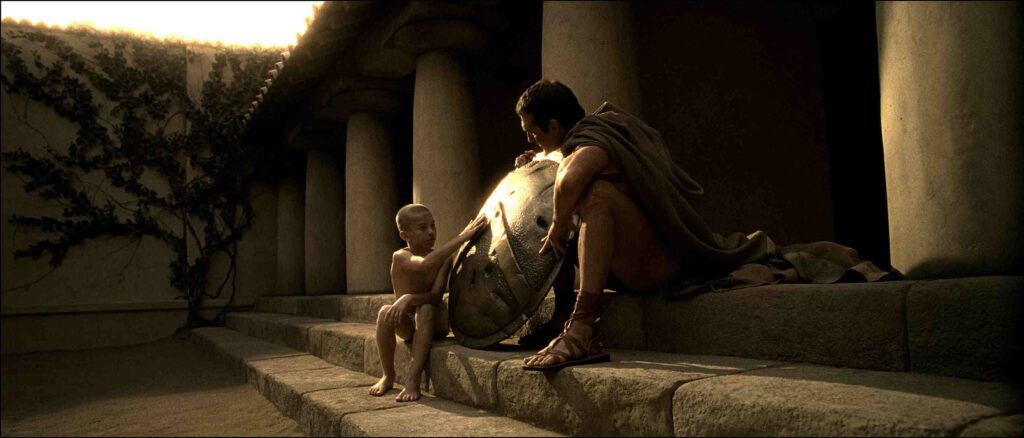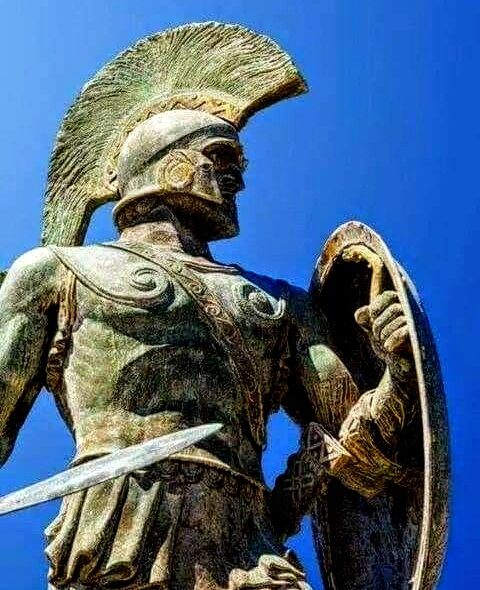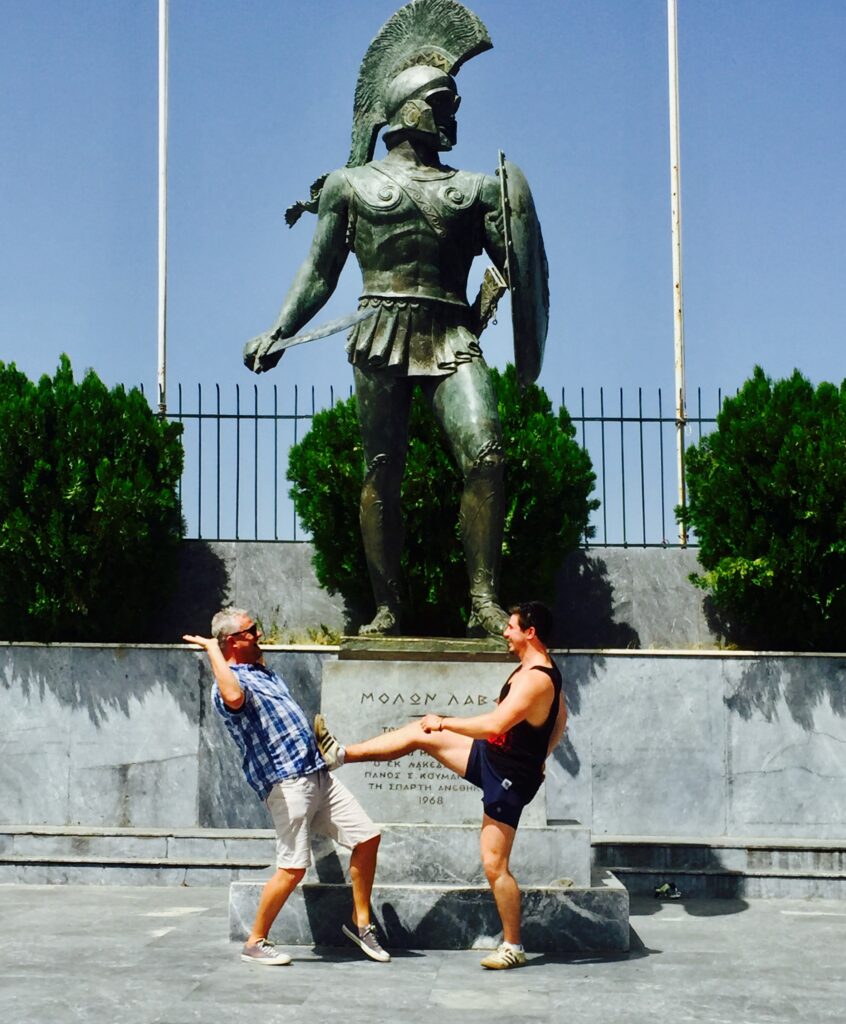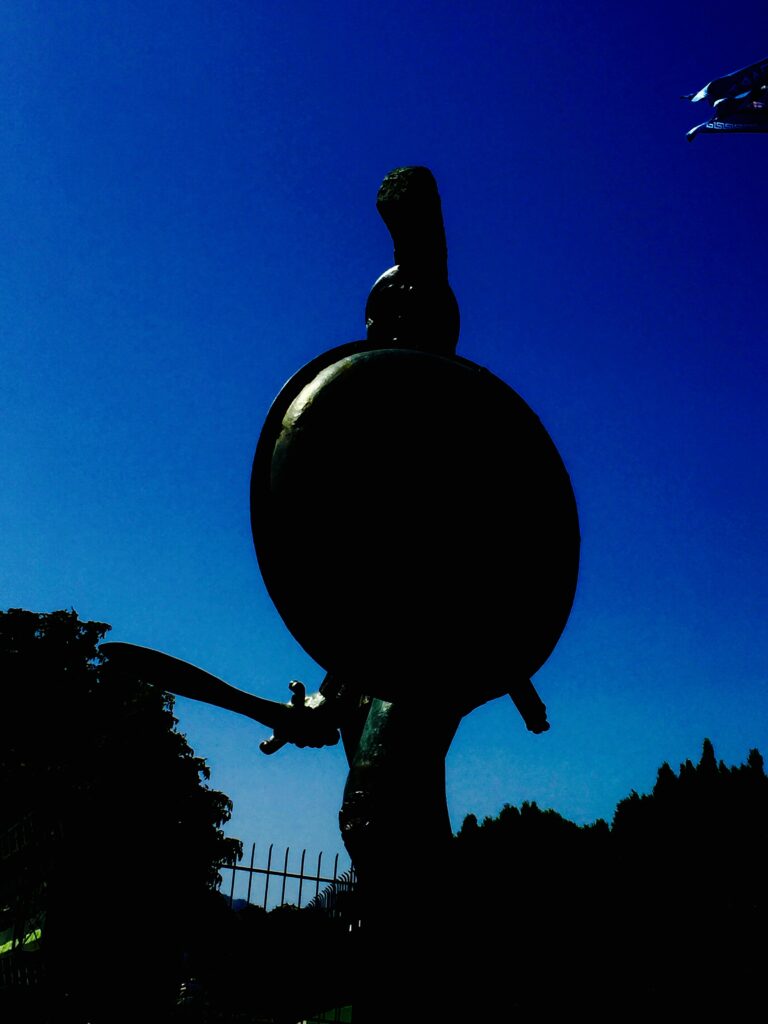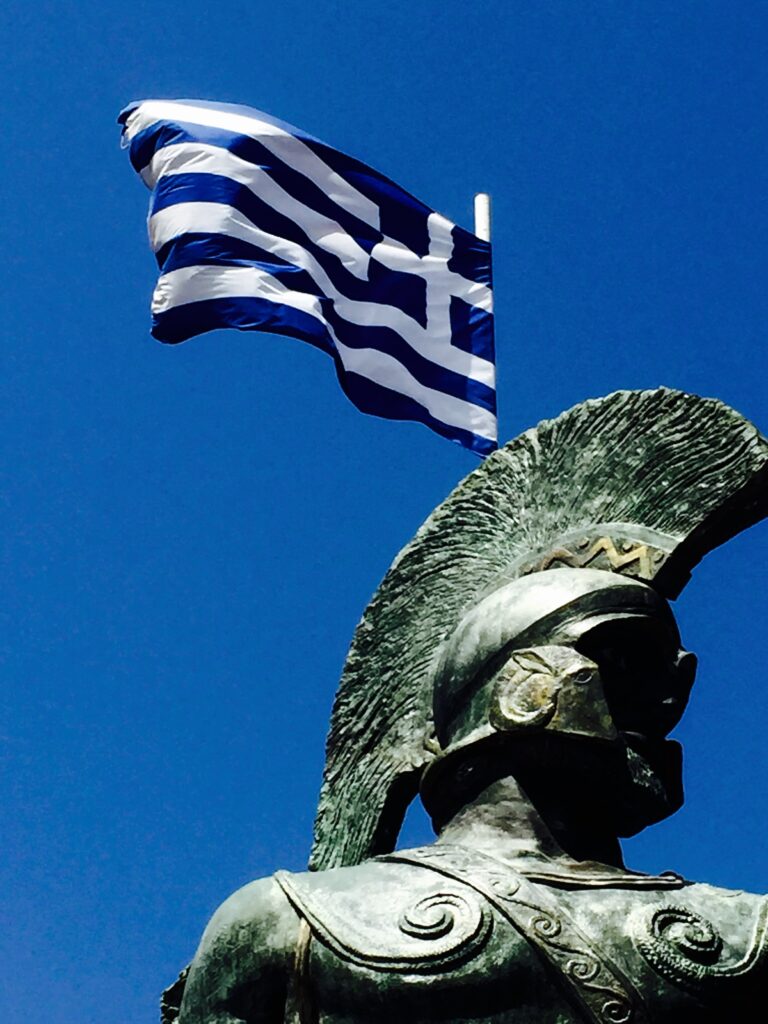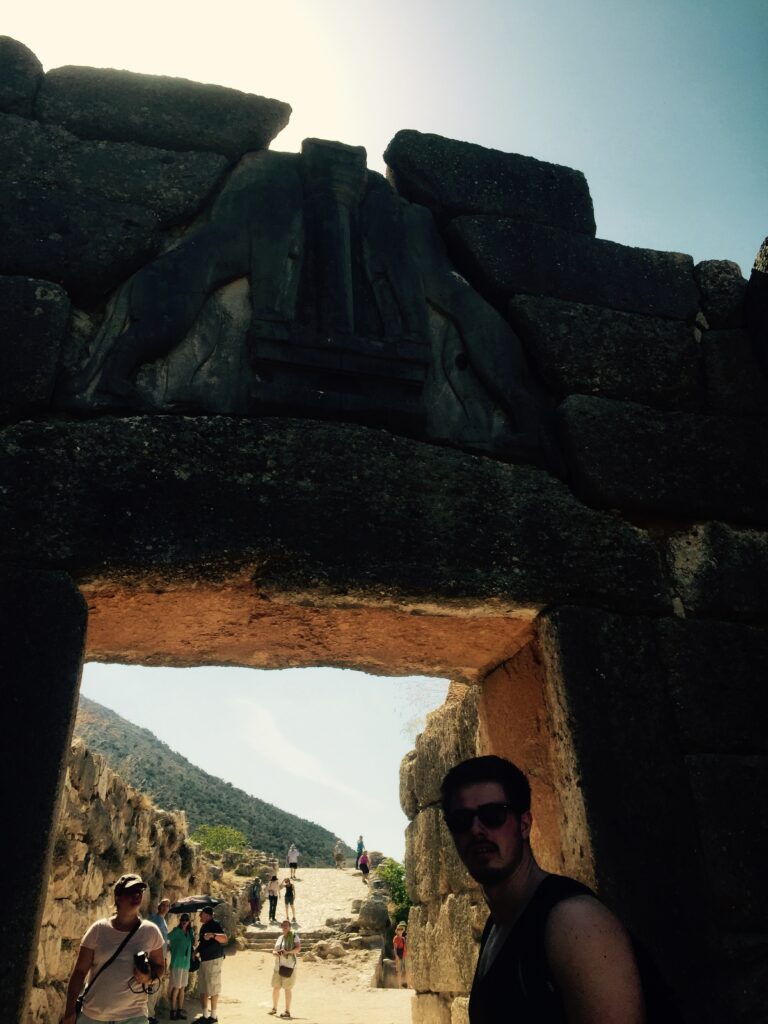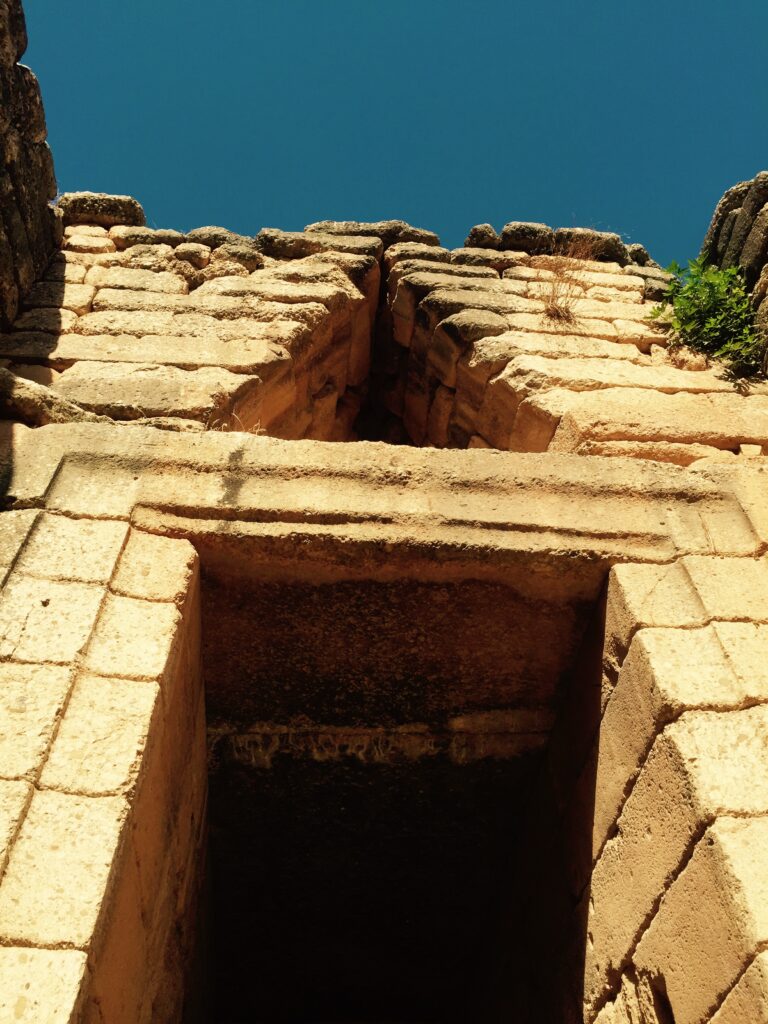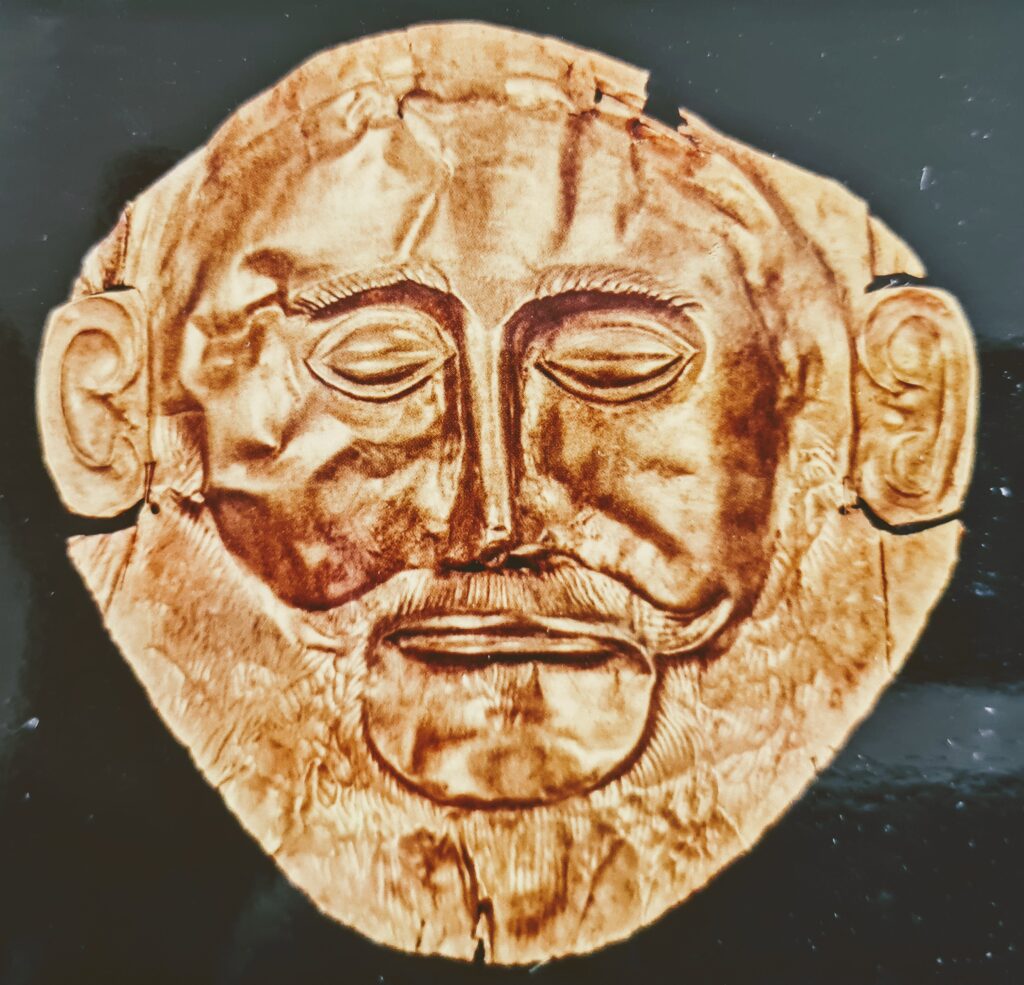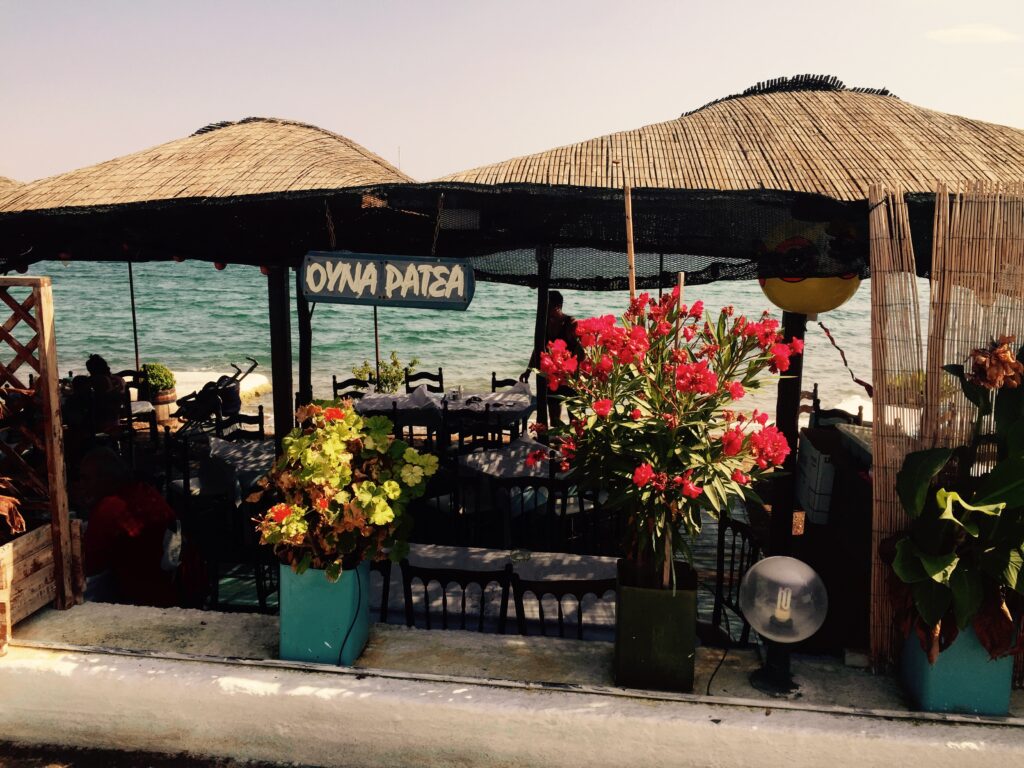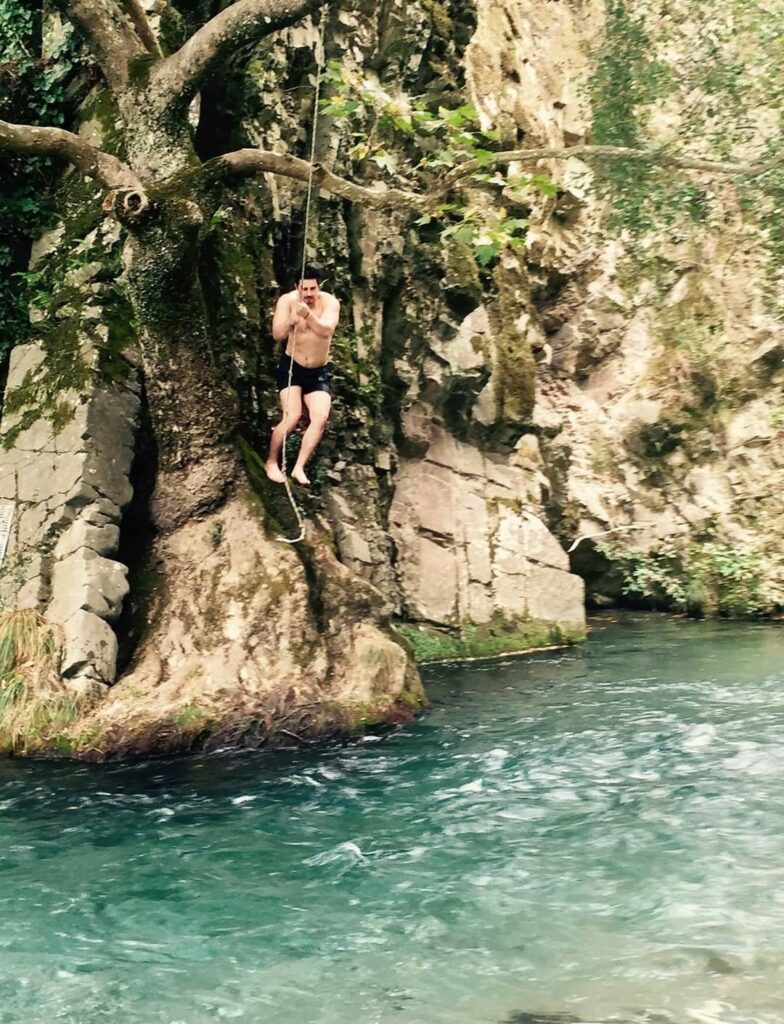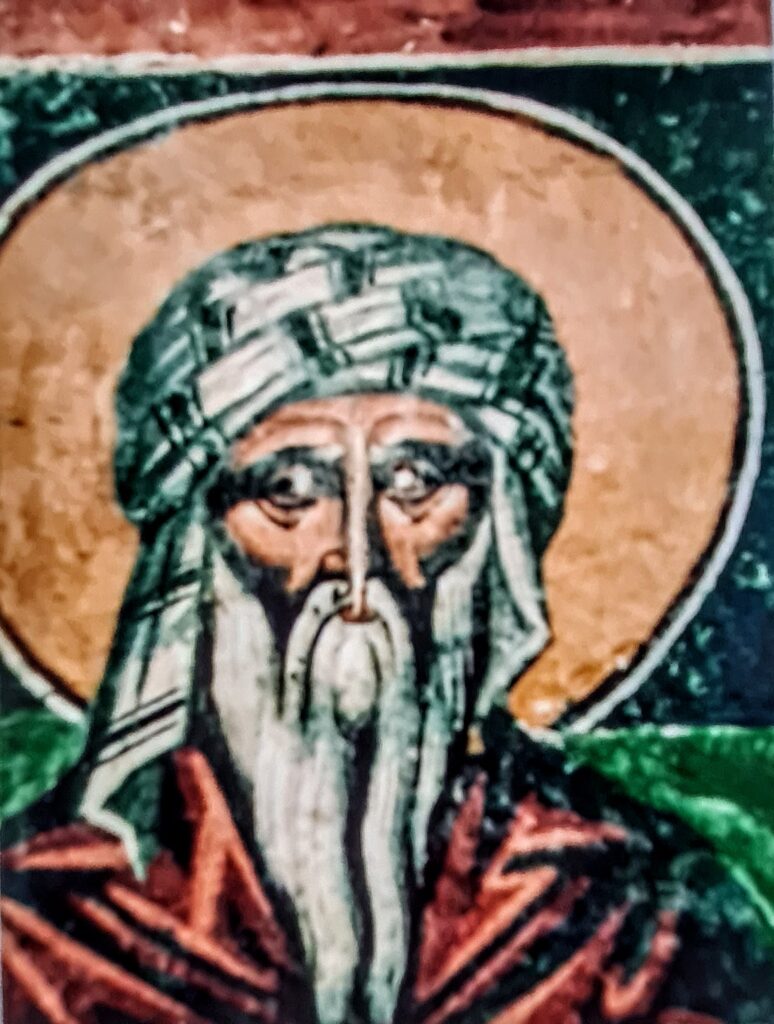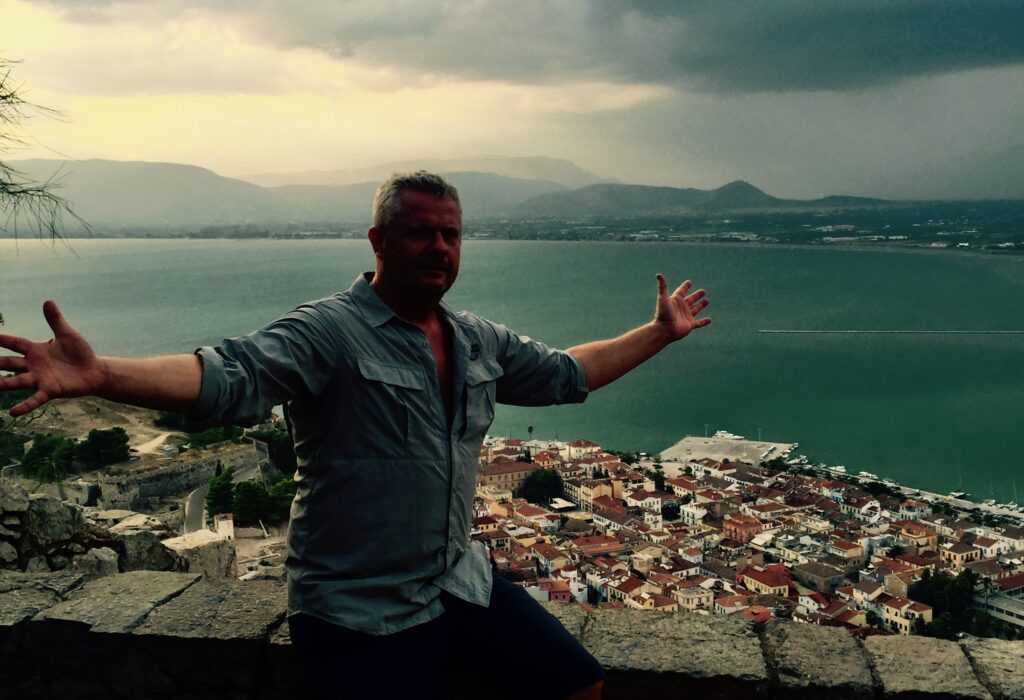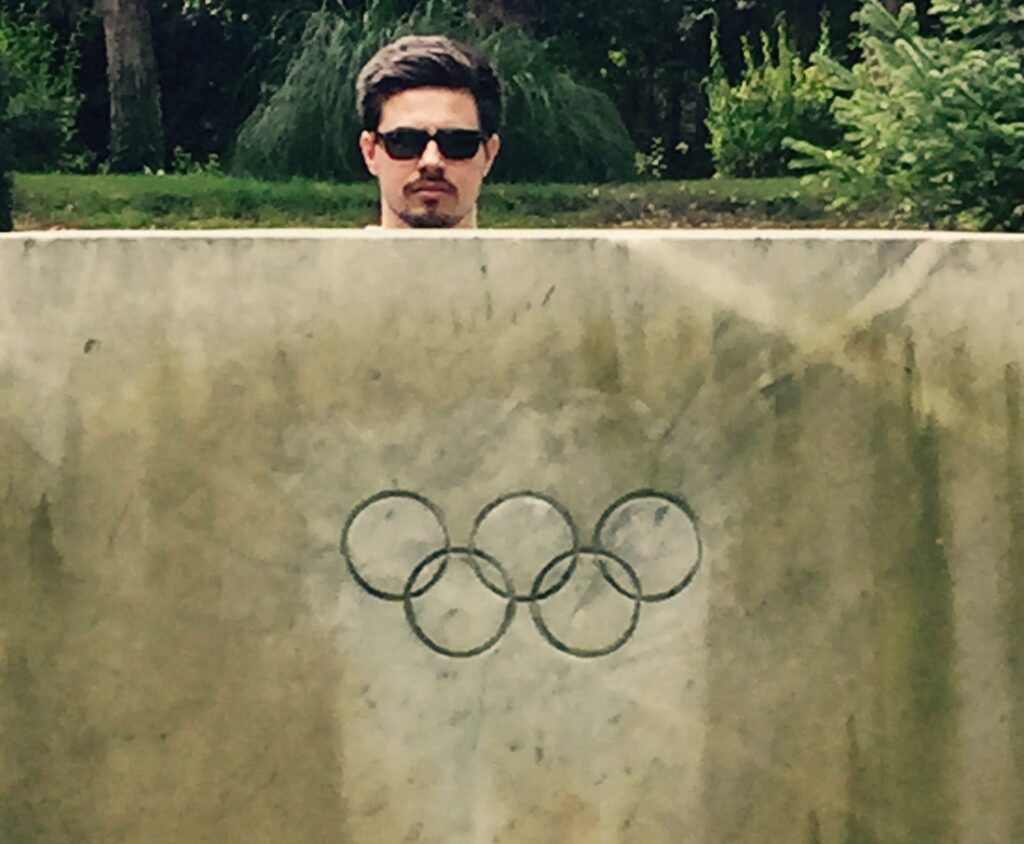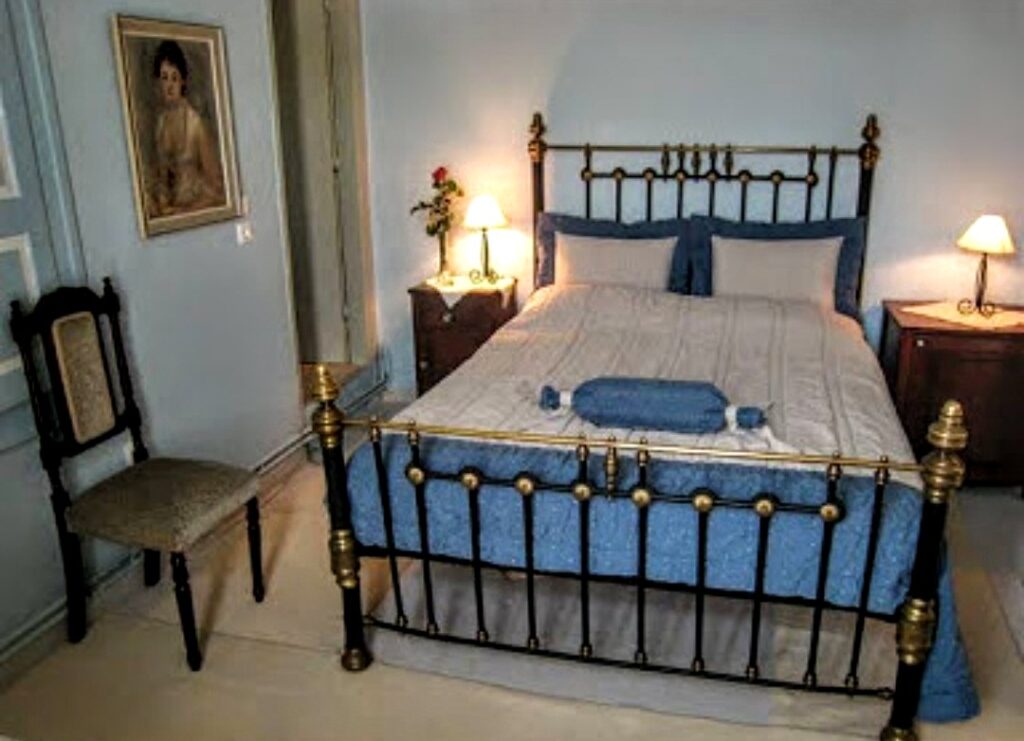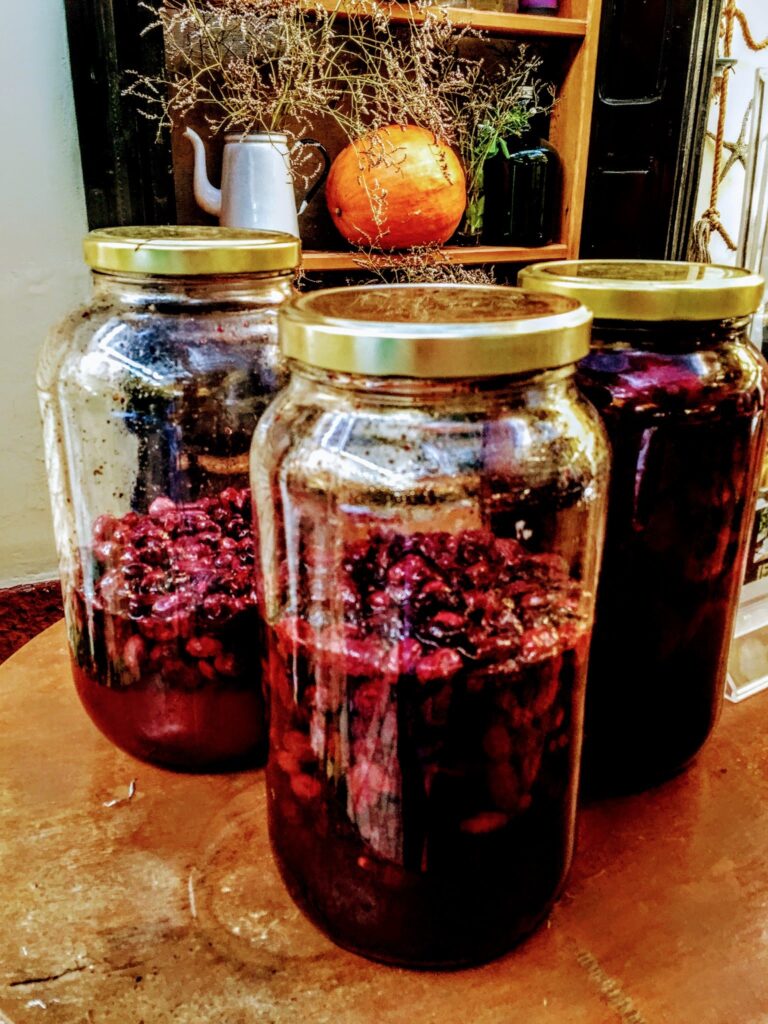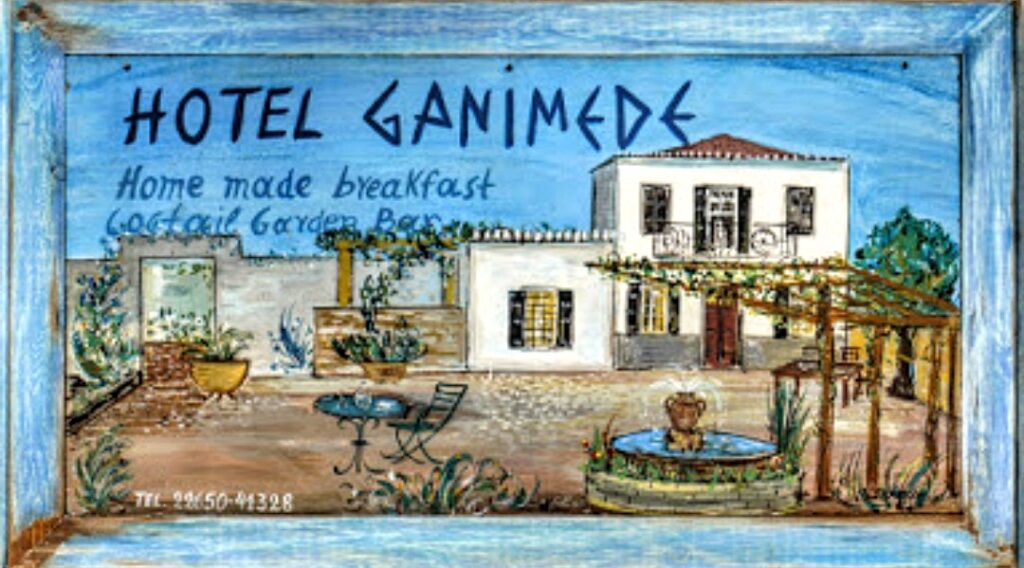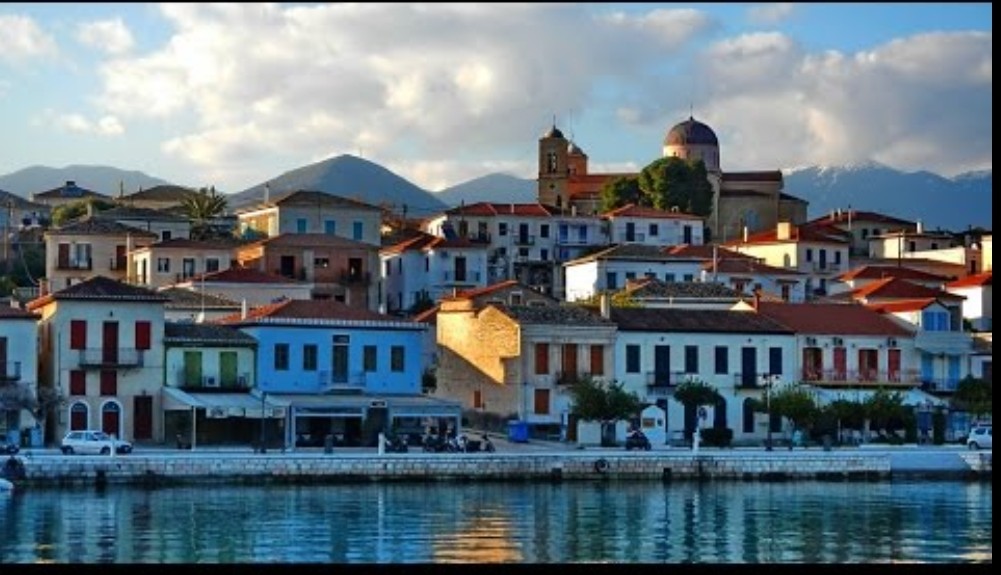“Where are you from?” enquires the mayor of Olympia. My son tells him we are from Brighton. We expect a blank, a lack of recognition. Instead, his eyes widen and his face illuminates the darkness of the cafe in which we are having a drink. “Brighton! Do you know a restaurant called Archipelago?”. We do. Very well. It is our favourite. “My friend, Georgios – it’s his”, continues the Mayor in an explosion of enthusiasm. “He was my school friend!” The mayor runs off to the bar – it is, we work out, his bar (his restaurant, his souvenir shop…he is mayor for a reason) and brings us back three bottles of tsipouro. Two quarter bottles for us and a 75cl bottle for his school chum. “Please, take this to him and say Yassou from me. He gave us his name. We thanked him for the bottles and promised we would make good on it as soon as we returned home. It was the perfect excuse to continue our Greek Odyssey from Albion – because Sam and I can’t get enough of this country.
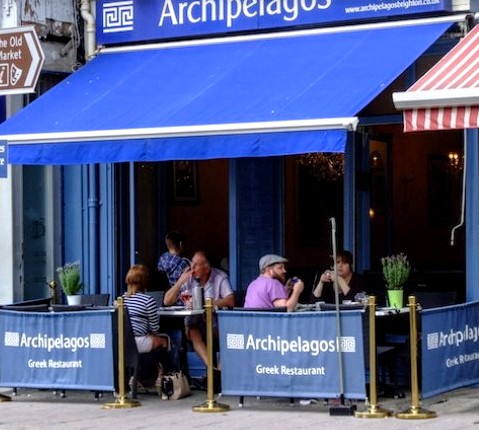
All my children have been brought up with the myths of the Ancient World and they have known the names of the Greek Heroes and the Gods from Mount Olympus from a very early age. But my eldest son took them to heart. His favourite family quiz question to set is to name the twelve labours of Hercules. One of his favourite films to watch is Harryhausen’s classic Jason and the Argonauts. Another is the more recent ‘300’ – the bloody, hyper-reality biopic about Leonidas and the 300 Spartans who blocked the pass at Thermopylae and died heroically, delaying Xerxes’ progress into mainland Greece to buy time for the City States to rally an army. So when, one summer, I suggested a tour around the ancient sites of the Peloponnese, he leapt at the chance. It was our very own pilgrimage back to the stories of his childhood.
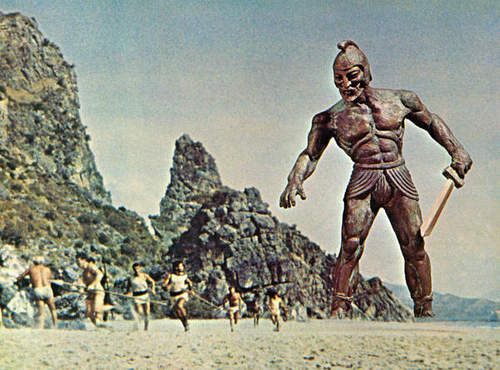
An hour from the airport, we pulled up to have a drink overlooking the Corinith canal. We travelled on to our hotel – the bedroom window overlooked a compound where, it seemed, all of the stray dogs in the town of Tripoli, congregated to sleep. This was a no frills adventure. The focus was on the history. We slept, ready for our immersion into 3500 years of time travel the following morning.
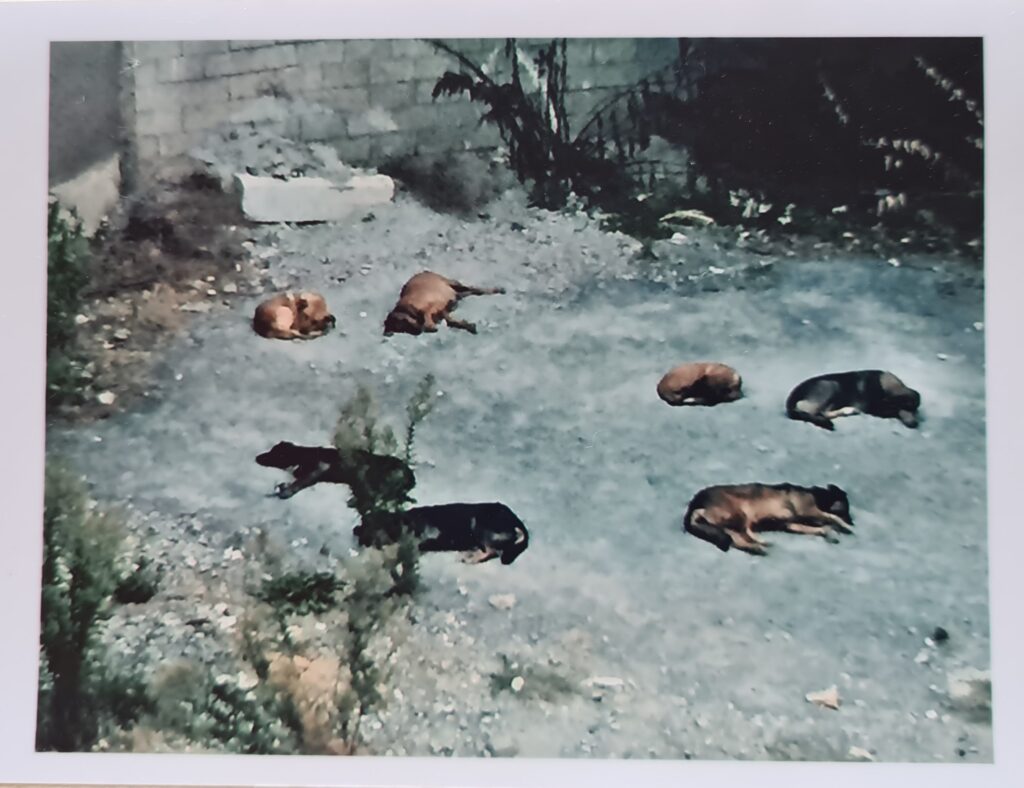
Our guide, Dimitris, was a curious mix of Greek and Alabama in the Southern United States. He had some controversial views about the Confederate flag – the notorious ‘Stars and bars’ emblem of the slave owning States was being removed in all the Southern State flags back then, due to its racist connotations. Dimitris felt this was historical revisionism and a denial of history. We, and our fellow travellers, a retired middle aged couple, he with bladder issues, she mouselike and meek, went silent. Dimitiris was on his own with this view, but, being Brits, after Dimitris’ rebuttal of a tentatively phrased “do you not feel that maybe some people find its associations a little, er, offensive, possibly a bit strong?” we kept our own counsel. We didn’t want to piss off our guide on Day One. Plus, this was a tour of places which would also not bear scrutiny under modern day morality.

We hit the outskirts of Sparta. Sam and I were smiling. A dream come true. We asked to stop the minibus so he and I could have our photo taken standing by the plinth depicting the legendary city name. The man with bladder issues disappeared into a local shop to attend to his needs. Hopefully not on the floor. We re-bussed and progressed to the theatre of the ancient town, which, like everything around us, was reduced to the dark stone rubble of ruins. Big, rectangular black stones littered the ground and, in some places, raised one atop the others for maybe three or four blocks to shape an arc of seats where, we were assured, the nobles and notables would have sat. Even though it was a heap of stones lying amongst the tall wild grass, in this blistering midday heat you could hear and feel the ancient warrior culture seeping out of every corner. We marvelled. And then, piece de resistance, we stood at the feet of the King who is Sparta’s most famous and bravest son: Leonidas. Towering above us, a bronze statue of the man who understood the meaning of ‘come back with your shield, or on it’. A man who went to certain death and took 300 of his kinsmen with him in defiance of the ephores – elders – to delay the mightiest army in the world. Sam re-enacted Leonidas kicking the Persian envoy down the bottomless well, having come to ask Sparta to bend the knee to Xerxes with an offering of earth and water. (The Athenians were not quite so preemptory – they put the envoys on trial first, then threw them down a hole in the ground to their deaths. Athenians – always more legalistic and due process-like.)
Guess who played the role of the Perisan envoy.
This was a particularly cruel fate given that my dearest wish when I went away to boarding school at the age of 8 – one year after Spartan boys were taken away from home to attend the Agoge – was to be a Spartan, as my two older brothers had been. I was made a Corinthian. (The school was divided into ancient Greek city states, called ‘houses’.) Twice denied. Although a Corinthian was probably more suited to my personality given it was a trading city rather than a military one. Maybe the great Sorting Hat of the School could tell my future, who knows.
From Sparta to Mycenae and to Agamemnon’s tomb. Each time we stopped, Bladder Man immediately headed for the nearest convenience. It became a ritual. From there to wonderful Epidaurus, the ancient site of the biggest and most complete theatre in the ancient world and where the practice of medicine began. Asclepius, God of Medicine, and the now international symbol of medicine, the snake, lived here. Maybe our friend with the weak bladder could see someone here? Maybe a kindly snake would bite him and cure his wonky waterworks?
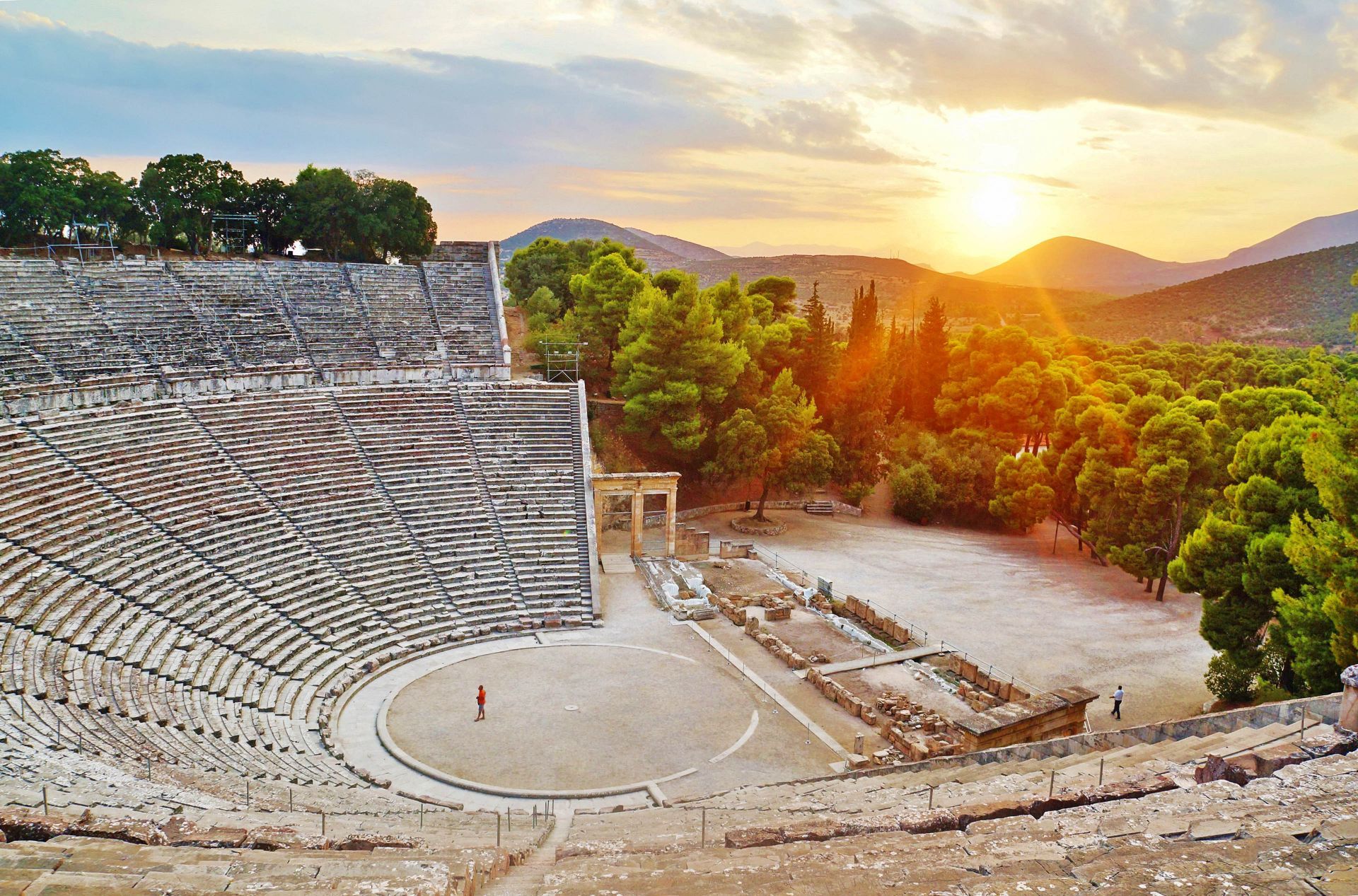
Sam and I take turns to stand in the centre of the stage and speak, gently whilst the other climbs to the very top and back row of seats in the semi circular stalls. You can hear every word as if they were being spoken directly into your ear. And we clap over the stone circle to hear the magnificent echo that reverberates around the theatre and surrounding cypress trees. I was last here in 1976 on an educational cruise on the SS Uganda. The next time I return to this magically wonderful place, I would like it to be to attend a concert or a play – which they still put on every summer. Yes, I would like that to be my final trip to Epidaurus.
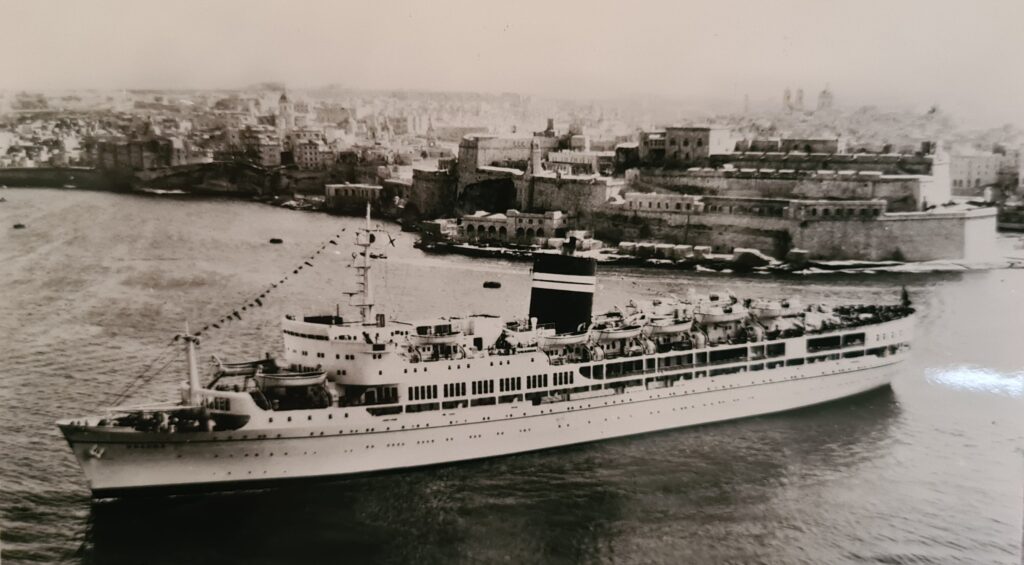
Back at the hotel and we learn how to make spinach pie – a recipe we try out on our family at Thorpeness the following year as an homage to the trip we are both loving so much. The conversation is of history and ancient times and we both ply Dimitris with questions in the minibus on our travels between sites and over beers and wine. He takes us to a wine maker where I develop a fondness for the family and the woman who offers us her different wines for tasting. It is her ancestral winery and the wines are good. We travel on to a cave complex which is as cold as it is mysterious and which is home to white, silken thin spiders which prey here in the dark waiting patiently for anything which wanders by and might make a meal. It is a ghostly place and they clearly wait many moons for a meal – which is why they are so thin and translucent. We stop for lunch at a tavern where our chair and table legs are literally lapped by the sea. The prawns are pink and the fish eaten head and all. It is a feast and enjoyed after a hard day’s travails.
We stop in mountain villages and take that black, strong Greek coffee as the Greek airforce, now surely bankrupt (this is the middle of the Euro crisis as Greece is bailed out with one loan after another by the EU, but which is really Germany) serenades us with not one, or two or three overhead passes, but four. The Starfighters, a pair, silver and ear splittingly loud, scream over the village and head down the gorge in a low level pass that enables us to see the pilots in their perspex domed cockpits. They are having fun. We – and all the villagers – are enjoying them having fun and the free air display.

The tour progresses. A trek through the gorge to see a monastery carved out of the precipice, where we drink cooling mountain water from a fish-shaped brass tap in the wall.
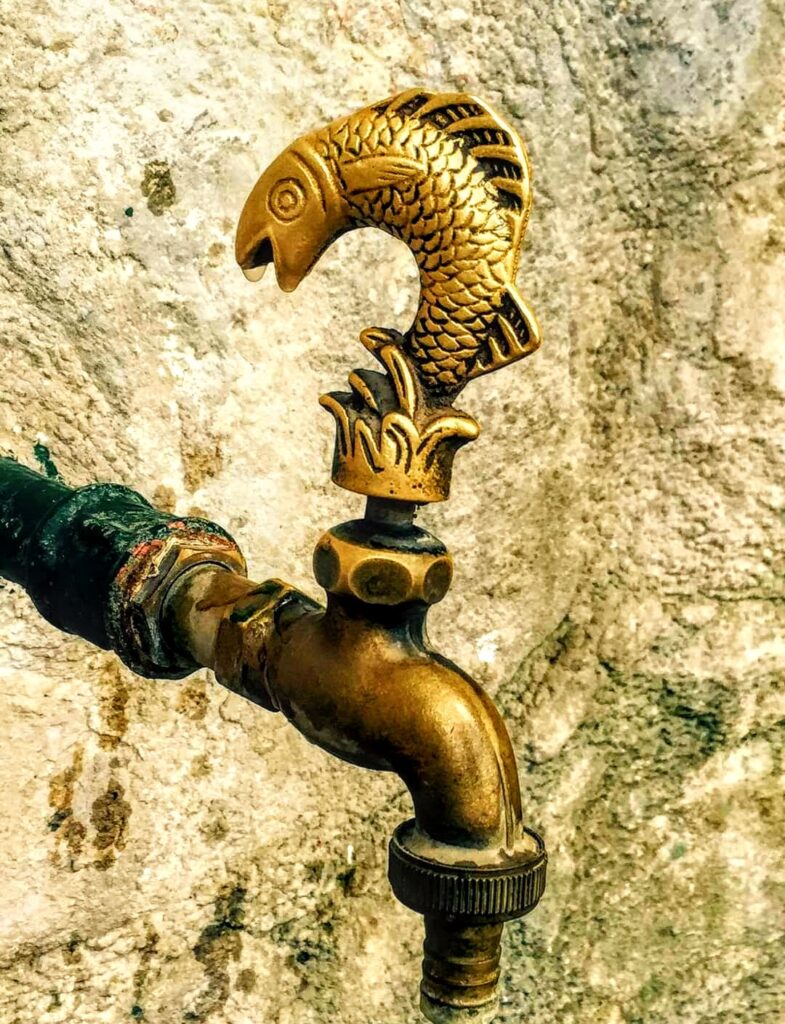
We pass wild horses in the canyon and take a picnic by an ancient stone bridge. Sam swings on a rope suspended from a tree across the river from the little stone beach where we eat and drops, with a splash, into the icy clear green-tinged water. I join him to cool off from the heat of the trek.
We visit Byzantine ruins with the ornate and still vivid wall paintings of icons and saints and we go to a place where, in the war of independence between 1821 and 1830, they manufactured gunpowder to fuel the struggle against the Ottoman Empire. It is a lovely mix of ancient and modern and an education in the history and culture of the Greek nation.
Later on in the evening of that day, Sam and I stroll through Triploi to the town square where, it seems, the children of the entire vicinity are at play. It is 10 o’clock at night. This is Mediterranean culture and children are not merely adults in waiting, as they are in the Protestant countries. They are children and they dart from playground to table as their elders sit and drink and dine and talk. It is the fabric of a nation which has seen it all before – disaster and triumph – and knows that life goes on. We wander to a restaurant and meet Dimitris’ wife and children. They are so welcoming but we leave them to their time together – we take her husband away from her enough without imposing on their family time, too.

To Delphi and the Oracle. High up the mountainside, here is this fabled place. A place where so many famous figures have sought their fate and guidance. We walk up past the little temple where the Delphic Oracle dispensed her sagacity and saw into the future, however obliquely and with whatever consequence. Up and on we go to the top, up the shining rocks of the Phaidriades to where the hippodrome lies. The view is across the plain to the Gulf of Corinth and it shimmers in the heat. You can imagine the ancient hotels bustling with tourists and seekers after help as they disgorge from the caravans that have now been replaced with coaches and cars. It is Disneyland for Rome and a place of prayer for Greeks.

On we go. To Olympia, site of the ancient Olympic Games and the place where, every four years, the Olmpic flame is lit from the sun and carried on torches from this place of origin to the venue for the modern games, wherever in the world that might be. Here we are met by the irrepressible guide, Mario. Mario is a musical orator, so full of life and knowledge that we soak up his stories with relish. He is a character. Ebullient, extravagant with gesture, he carries his learned guidebooks and official passes and maps under his arms as he unveils the stories of this magnificent place.
Only 12 people were ever convicted of cheating in the ancient games, and their names live on in notoriety, he says. He shows us the plinths on which the heroes of old, the athletes who competed for honours, would have stood, triumphant in their immortal victory. They are all gone now. I ask Sam if he would like to stand on one and strike a pose for the camera, but he declines – it would, he feels, signify a lack of respect for the athletes who competed here for glory. It is a nice historical sensibility. We stand under the gate where the athletes entered the arena. You can feel our excitement. Sam is beaming. This, for a sportsman, is it. It. This is where it all began. We walk in. Sam turns around in a circle to savour the atmosphere. It is palpable. Mario enjoys our enjoyment. He asks if Sam would like to run up the track and points to the lines of stones in the sandy gritty surface which signal the start line for all the races. Sam hunkers down in the starting position. On your marks, get set..go! He’s off, running – well, jogging – down the track to the end. On his return he asks if I want to have a run. “My joy is seeing your joy”, I reply. And it is. It truly is. To see his animation at being in this place is one of those moments only a parent can understand.
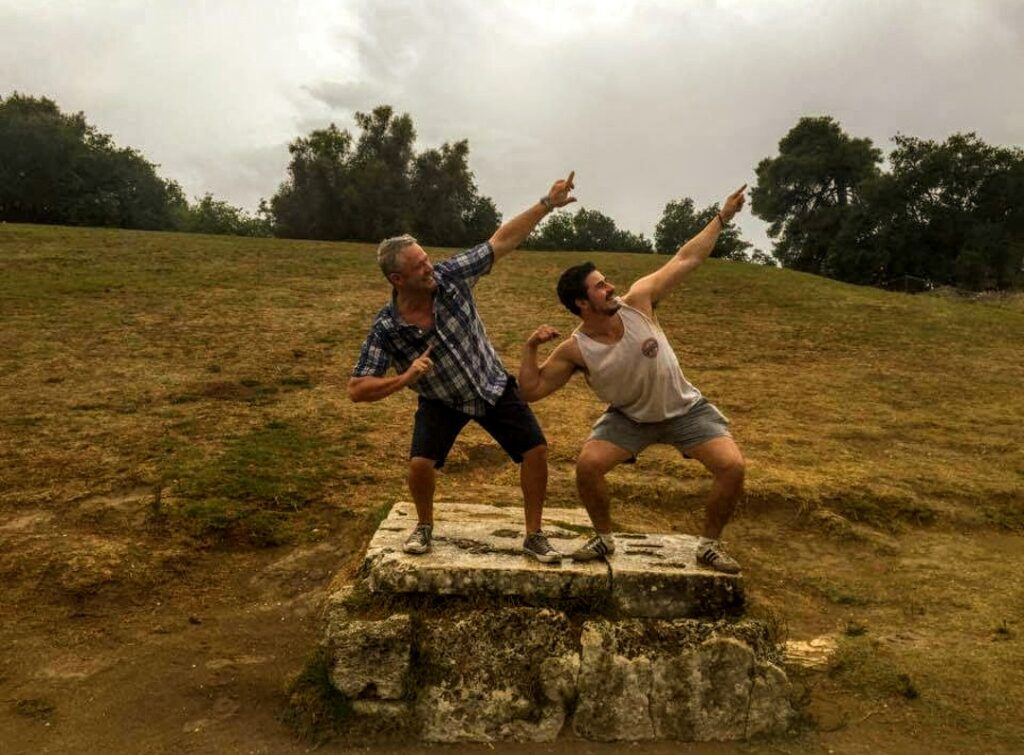
We round off our time in the stadium with a Usain Bolt style salute of the victor, both of us on the podium used by the Greats of Old when they received their crown of olive leaves in recognition of victory. No historical sensibility here – it is too good an opportunity to be true. Our triumphalism done, Mario escorted us to the Mayor’s cafe where I buy a bronze warrior head in Spartan helmet as a commemoration of the trip for Sam’s Sacred shelf of Remembrance – the shrine of memorabilia that Sam has collected over the years. A sort of Aladdin’s Cave of Historical G(r)eekism.
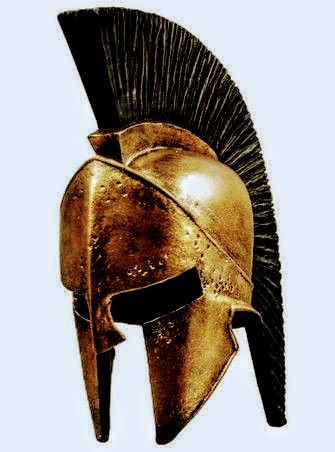
Athens beckons as the final leg of our whistle stop tour. We travel there with an overnight stop at the Ganimede hotel the town of Galaxidi. The B&B is welcoming and quaint. Old school – doilies, dark, heavy sideboards and robust beds with simple, pretty bedspreads. The owner is a Greek woman in her late thirties. In the evening we wander through the village to the quayside and have a swim from the jetty as the townsfolk sip their coffee or wine and look on. It is clear water and cooling from the day’s travel. A lovely, peaceful oasis. We join Dimitris and the weak-bladdered man and his wife for dinner. The hum of the village on the harbour side. Life is at ease this evening.
Athens. We are on the roof terrace of our hotel and the view is one of the most famous views in all of history – the Parthenon atop the Acropolis, floodlit in an orange glow as the dark night sky provides a backdrop. Normally, the canopy of stars in a night sky would eclipse any Earthly view. Not so tonight. This ancient and magnificent Metropolis lies beneath Athena’s temple, waiting for us. We are here. We finish our drinks and walk in to the heat of the night and the noisy, crowded streets and arcades. A restaurant beckons and we have our final dinner of this very Greek adventure. I am reminded of Dimitris’ ridiculing of the Turks’ naming of what is modern day Istanbul. “They called it Constantinopolis – polis is the Greek word for ‘city’. So they called their main city, “city”. ” He laughs and raises his eye brows as if this is self-evidently stupid. As ever in this tale of perpetual enmity between the two nations, this is only half true. The city of Constantine is a perfectly legitimate title for a great city founded by an Emperor. We let Dimitris have his victory. There are 400 years of suffering behind it, so it is a legitimate snipe. And we are in his homeland, so we are partisan tonight.

The female academic is serious but has a light touch. She is very Greek. We are in the Acropolis Museum at the foot of our intended target. We are shown the different stages of the Greek statuary – the Geometric, Archaic, Classical and Hellenistic. We see the remains of a statue of the Roman Emperor Hadrian, his breastplate a dead giveaway of his allegiances: Romulus and Remus suckling at the Capitoline Wolf underneath the full length image of the goddess Athena. Athens over and above Rome – a very significant message: Hadrian was a big fan of this City. As we progress around the museum Sam and I keep glancing, longingly, out of the panoramic windows up at the Parthenon. And at our watches. We have a deadline. Eventually I say something. “We love this and it is all fascinating but we are worried we will run out of time to visit the actual star of the show. We have to get up there and look around and that is where we would like to be now, please.” A half smile of amusement played across her mouth. “So Anglo-Saxon. What is the rush?” “We have a plane to catch.” “It will wait. Ten minutes. Fifteen minutes. What’s the rush. ” She carried on with her tour of the artefacts. “No. Really, we want to go up there to the Parthenon now. Please.” She stopped. The half smile. “Ok.” Her body said “Philistines”. Her lips said:”Rush, rush. The plane will wait.” Er. No it won’t. Cue muttered remarks between us Brits about how this approach might explain the current mess of the Greek economy. It was a sour note. But it was also a little glimpse into two totally contrasting ways of living. My feeling is that Spartans and ancient Athenians were also in a hurry. But there is also a lot to be said for laissez-faire fatalism. She was laconic, elegant and unhurried. The experience was to be savoured and here we were, we Anglo-Saxons, devouring it without relish. The tortoise and the hare.

We hares half walked, half ran up to the summit. There it was – right up close. Beautiful. Awe inspiring. Vast. We breathed it in and revelled in the sight. This was the climax of our trip – to be here, in front of this building. This building which has not only borne witness to the history of the Western World, but is that history, incarnate. I replaced a splinter of marble that I had appropriated on my 1976 visit as a boy, which I had packed especially for this moment. If the British Museum won’t return the fabled Elgin Marbles, the least I can do is give back my booty from three and a half decades ago. The piece goes back on the ground. In reality, it is probably just a fragment of paving stone, a chip of building material, but it feels like a homecoming. The flag of the modern greek state flies in a beautiful flutter of blue and white at the far end of the Acropolis. It is a place of significance, for here, the Evzones soldier, Koukidis, made his last stand against the Nazis on 27 April 1941.
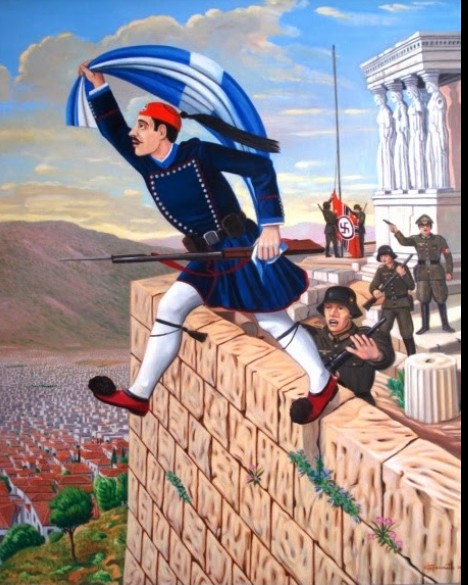
Guarding the Greek flag, he was commanded by the German officer to lower it and run up the Swastika of the occupying army. Koukidis lowered the Greek flag, wrapped it around his body, leapt over the wall and fell down the mountainside to his death rather than surrender it to the fascists. Here was our modern day Leonidas. The heroism of the Ancients clearly lives on to this day.

The sojourn in this loved land was done. The stories of Sam’s youth had come alive in him and me and it was a journey of and to treasure. We returned home and delivered our bottle of tsipouro to Georgios at the Archipelago restaurant. He reminisced about his school years friend and we stayed for lunch. Whenever I feel in need of sunshine or stories, whenever my world needs a lift, I head for the taverna, for kleftiko, spanakopita, fried feta or souvlaki. And a bottle of Dogmatikos. Greece is where it all began. And I hope it is where it all ends. Some places are magical, especially in the company of a son who loves those places with a shared fervour. Yamas.
